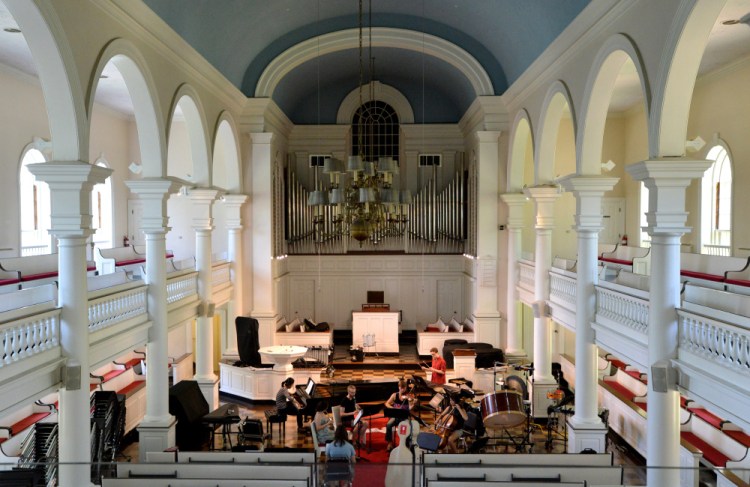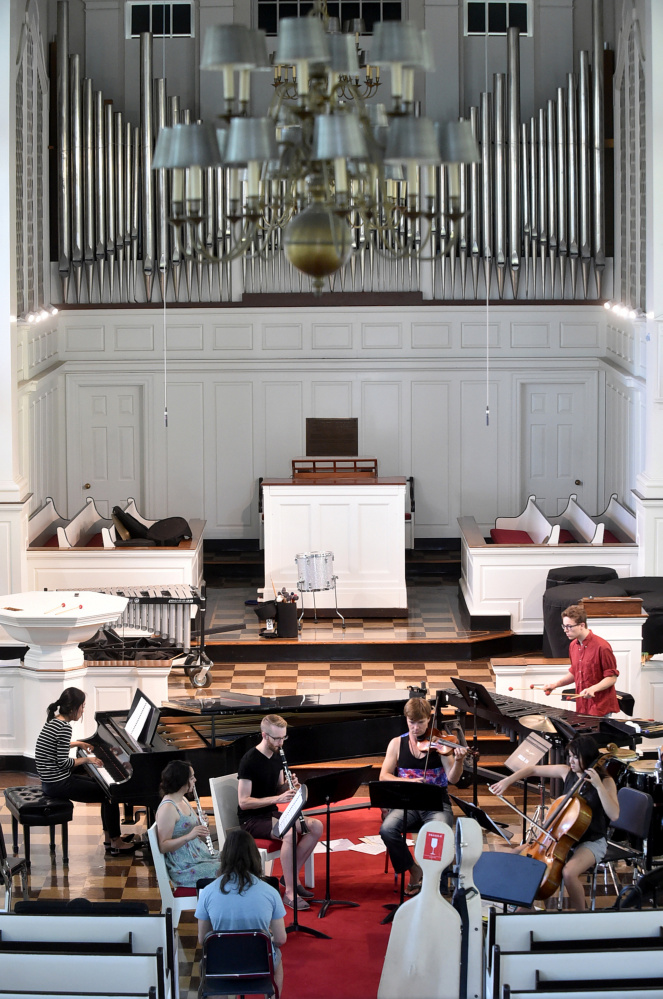WATERVILLE — On Saturday, the Atlantic Music Festival will kick off its ninth consecutive season at Colby College, giving the public nearly a month of opportunities to come and hear free classical music at the college.
The festival, which began at Colby in 2009, brings together student musicians and professional guides to play dozens of concerts around campus, most in Lorimer Chapel but others in venues such as Given Auditorium, the Strider Theater and the Marchese Blue Light Pub. An estimated 175 students will perform chamber music written by AMF composers for instrumental ensembles at the first concert at 1 p.m. Saturday at Lorimer Chapel.
Richard Dillenbeck, a volunteer with the organization helping to get the word out about the concerts, said the schedule has to remain flexible and the content of the concerts could change from week to week. Even so, Dillenbeck said anyone who likes music can pick and choose what they want to go to.
The concert series, which runs until July 29, is broken up into five divisions: chamber music, full orchestra, composition, conducting and opera. Over 300 performances have taken place during the festival’s first eight years, and this year about 40 performances are planned. The festival has many recurring events, such as the AMF Orchestra performing sets of eclectic programs at 7 p.m. on Saturdays and AMF’s Chamber Music Series playing on Wednesdays and Fridays at 7 p.m. Additional performances also may develop as the festival progresses.
While most of the musicians are students working toward master’s degrees, Dillenbeck said they are not amateurs. They are musicians who have decided to make their careers in classical music. While the festival is an opportunity to continue developing their skills, they come knowing how to play.
“The quality of the music is very good. It’s not amateur,” Dillenbeck said.
Dillenbeck, who has gone to the festival every year since it started, said he volunteers because he loves classical music and wanted to see if he could help. The events have not always been well attended in past years, and Dillenbeck said that’s probably because festival organizers are more concerned with the students than with publicity.
“They don’t want to take time to spend on putting out information on concerts,” he said. “They want to focus totally on the students.”
Dillenbeck said people also might not have known the concerts were going on in previous years. This year, the festival is working with Waterville Creates! to get the word out.
Colby, which hosts a variety of programs during the summer when regular classes are not in session, always has hosted the festival. The students stay in the college’s dormitories and eat on campus, while some of the program’s staff members reside off campus. That staff is made up of professional musicians from around the world, Dillenbeck said, representing an “unusual group of people satisfied and energized by classical music.”
While the Atlantic Music Festival isn’t the only classical music training facility around, Dillenbeck said it’s an important one. The participating students probably will perform one day in front of audiences around the world, and Dillenbeck said that for them this is an opportunity to experience performing in front of any kind of a crowd.
“This is the way they’ll spend their professional lives,” he said.
Solbong Kim, the program’s artistic director, said the monthlong event is more a retreat than a camp. “It’s a sanctuary of sorts.”
Kim, whose role is to oversee the artists and the kinds of music being created, said the festival is a way for these younger musicians — who come from all over the world — to get to work with “great masters of music” and connect in a personal way. Most at the festival are working toward obtaining master’s degrees, some toward doctoral degrees. In a typical month, their program puts on as many concerts as a small city.
Kim said the benefit of a retreat like this is that it’s not set up to be a competition. Many younger musicians grow up in chains of competitions, he said, which can often lead them to forget why they fell in love with classical music in the first place. He said the point of the festival is to get these musicians back into that mindset of why they fell in love with the music.
“We’re all just friends playing music with each other,” he said.
The festival also continues its philanthropy with its I Am Four Years Old campaign. Launched in 2012, when the festival entered its fourth season, the campaign donates all concert proceeds received via donations to various causes or charities. According to the festival’s website, through the donation, “the festival both cultivates an awareness of its musicians’ place within their respective communities and explores the musicians’ ‘reply,’ whether it be to violence, social injustice, lack of clean water, or illnesses.”
The concerts are the festival’s gift to the community, Kim said, and they are free in order to allow the musicians to “not be bound by a commercial environment.” This allows the musicians to be more experimental, he said, and not feel commercially obligated to perform certain ways.
“That’s hard to do with a concert that’s charged,” he said.
Dillenbeck said he always has been impressed with the focus the students have on classical music. While they are still young people, they are disciplined in the practice of their craft, which Dillenbeck said is impressive.
“To me it’s kind of an inspiration to see these young people so devoted,” he said.
In a “world so filled with noise,” Dillenbeck said classical music has great value. “I and many others find listening to classical music and focusing as very comforting.”
The last concert is scheduled for July 29, which will be a full orchestra performance in Lorimer Chapel at 7 p.m.
For more information about the festival, including the complete schedule of events and ticket reservations, visit the website at www.atlanticmusicfestival.org, or call the festival office at 888-704-1311.
Colin Ellis — 861-9253
cellis@centralmaine.com
Twitter: @colinoellis
Send questions/comments to the editors.




